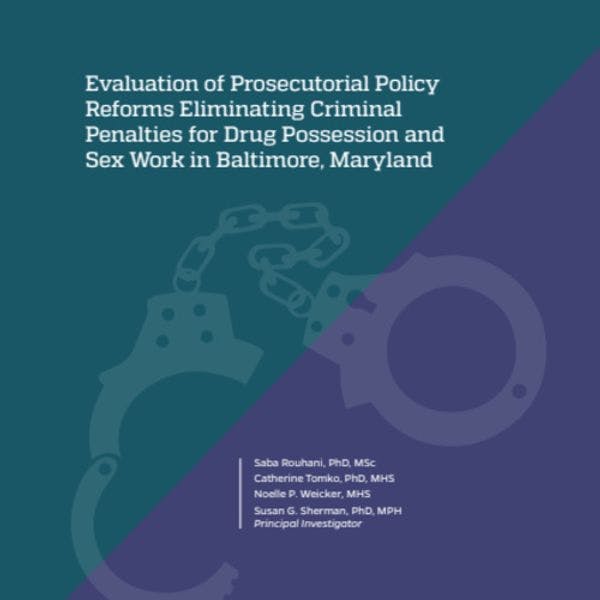Evaluación de reformas de políticas procesales que eliminan sanciones penales por posesión de drogas y trabajo sexual en Baltimore, Maryland
Saba Rouhani et al. arrojaron luz sobre hallazgos preliminares que sugieren que disminución en el número de arrestos y procesamientos de personas en situaciones de vulnerabilidad no conllevan mayor inseguridad o molestias. Más información, en inglés, está disponible abajo.
By Saba Rouhani, Catherine Tomko, Noelle P. Weicker & Susan G. Sherman
This report presents findings from an evaluation of criminal legal policy reforms impacting vulnerable populations in Baltimore City. At the request of State’s Attorney Marilyn Mosby’s Office, researchers from the Johns Hopkins Bloomberg School of Public Health examined the potential impacts of the decision to cease prosecutions of drug and paraphernalia possession and of prostitution. This policy was initially implemented in March 2020 as an emergency measure for infection control during COVID-19 and formalized as an indefinite policy in March 2021.
Key findings:
• In March 2020, State’s Attorney Marilyn Mosby announced that drug and paraphernalia possession as well as prostitution would no longer be prosecuted in Baltimore City.
• In the 14-month period following the policy change, we observed significant declines in arrests for drug and paraphernalia possession as well as prostitution, as reported by both the Baltimore Police Department and the State’s Attorney’s Office.
• Using Baltimore Police Department-reported arrest data, we estimated that 443 drug and paraphernalia possession arrests were averted in the 14-month period following the policy change, the majority (78%) of which were averted among Black individuals.
• Using Maryland Courts Judicial Information Systems arrest data, we found an extremely low prevalence of rearrests for serious crimes, such as robbery and assault, in the 14-month period following the policy change: 0.8 percent, or six of the 741 individuals whose drug and prostitution charges were dropped. This suggests that the vast majority of direct beneficiaries of the policy change did not go on to commit crimes threatening public safety.
• There was no evidence of an increase in public complaints pertaining to drugs or prostitution, measured by 911 calls made in Baltimore City, following the policy change.
• Though causality cannot be established, these preliminary findings suggest that declining to prosecute low level drug and prostitution offenses may avert arrests among individuals with intersecting vulnerabilities without posing a threat to public safety or resulting in increased public complaints. Ensuring that these individuals can access health and social service instead of criminal punishment is a public health priority.
